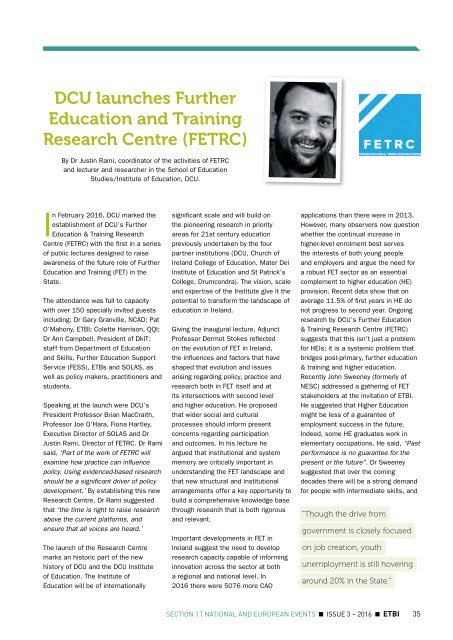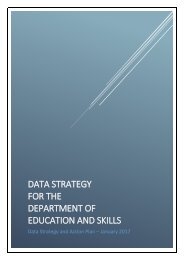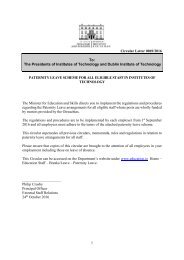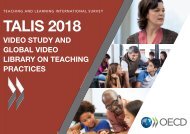ETBI-News-Summer-2016-web
ETBI-News-Summer-2016-web
ETBI-News-Summer-2016-web
Create successful ePaper yourself
Turn your PDF publications into a flip-book with our unique Google optimized e-Paper software.
DCU launches Further<br />
Education and Training<br />
Research Centre (FETRC)<br />
By Dr Justin Rami, coordinator of the activities of FETRC<br />
and lecturer and researcher in the School of Education<br />
Studies/Institute of Education, DCU.<br />
In February <strong>2016</strong>, DCU marked the<br />
establishment of DCU’s Further<br />
Education & Training Research<br />
Centre (FETRC) with the first in a series<br />
of public lectures designed to raise<br />
awareness of the future role of Further<br />
Education and Training (FET) in the<br />
State.<br />
The attendance was full to capacity<br />
with over 150 specially invited guests<br />
including: Dr Gary Granville, NCAD; Pat<br />
O’Mahony, <strong>ETBI</strong>; Colette Harrison, QQI;<br />
Dr Ann Campbell, President of DkIT;<br />
staff from Department of Education<br />
and Skills, Further Education Support<br />
Service (FESS), ETBs and SOLAS, as<br />
well as policy makers, practitioners and<br />
students.<br />
Speaking at the launch were DCU’s<br />
President Professor Brian MacCraith,<br />
Professor Joe O’Hara, Fiona Hartley,<br />
Executive Director of SOLAS and Dr<br />
Justin Rami, Director of FETRC. Dr Rami<br />
said, ‘Part of the work of FETRC will<br />
examine how practice can influence<br />
policy. Using evidenced-based research<br />
should be a significant driver of policy<br />
development.’ By establishing this new<br />
Research Centre, Dr Rami suggested<br />
that ‘the time is right to raise research<br />
above the current platforms, and<br />
ensure that all voices are heard.’<br />
The launch of the Research Centre<br />
marks an historic part of the new<br />
history of DCU and the DCU Institute<br />
of Education. The Institute of<br />
Education will be of internationally<br />
significant scale and will build on<br />
the pioneering research in priority<br />
areas for 21st century education<br />
previously undertaken by the four<br />
partner institutions (DCU, Church of<br />
Ireland College of Education, Mater Dei<br />
Institute of Education and St Patrick’s<br />
College, Drumcondra). The vision, scale<br />
and expertise of the Institute give it the<br />
potential to transform the landscape of<br />
education in Ireland.<br />
Giving the inaugural lecture, Adjunct<br />
Professor Dermot Stokes reflected<br />
on the evolution of FET in Ireland,<br />
the influences and factors that have<br />
shaped that evolution and issues<br />
arising regarding policy, practice and<br />
research both in FET itself and at<br />
its intersections with second level<br />
and higher education. He proposed<br />
that wider social and cultural<br />
processes should inform present<br />
concerns regarding participation<br />
and outcomes. In his lecture he<br />
argued that institutional and system<br />
memory are critically important in<br />
understanding the FET landscape and<br />
that new structural and institutional<br />
arrangements offer a key opportunity to<br />
build a comprehensive knowledge base<br />
through research that is both rigorous<br />
and relevant.<br />
Important developments in FET in<br />
Ireland suggest the need to develop<br />
research capacity capable of informing<br />
innovation across the sector at both<br />
a regional and national level. In<br />
<strong>2016</strong> there were 5076 more CAO<br />
applications than there were in 2013.<br />
However, many observers now question<br />
whether the continual increase in<br />
higher-level enrolment best serves<br />
the interests of both young people<br />
and employers and argue the need for<br />
a robust FET sector as an essential<br />
complement to higher education (HE)<br />
provision. Recent data show that on<br />
average 11.5% of first years in HE do<br />
not progress to second year. Ongoing<br />
research by DCU’s Further Education<br />
& Training Research Centre (FETRC)<br />
suggests that this isn’t just a problem<br />
for HEIs; it is a systemic problem that<br />
bridges post-primary, further education<br />
& training and higher education.<br />
Recently John Sweeney (formerly of<br />
NESC) addressed a gathering of FET<br />
stakeholders at the invitation of <strong>ETBI</strong>.<br />
He suggested that Higher Education<br />
might be less of a guarantee of<br />
employment success in the future.<br />
Indeed, some HE graduates work in<br />
elementary occupations. He said, “Past<br />
performance is no guarantee for the<br />
present or the future”. Dr Sweeney<br />
suggested that over the coming<br />
decades there will be a strong demand<br />
for people with intermediate skills, and<br />
"Though the drive from<br />
government is closely focused<br />
on job creation, youth<br />
unemployment is still hovering<br />
around 20% in the State."<br />
Section 1 | National and European Events issue 3 – <strong>2016</strong> <strong>ETBI</strong> 35





